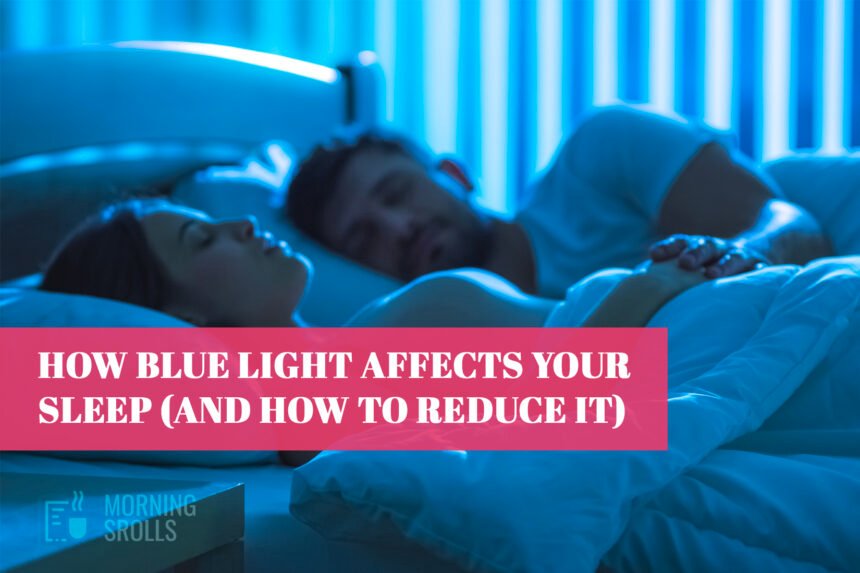What is Blue Light?
Blue light is a type of light that surrounds us throughout the day. It comes from natural sources like the sun and artificial sources such as smartphones, computers, televisions, and fluorescent lights. Blue light has the shortest wavelength and most energy among visible light colors.
While blue light helps keep us alert during the day and supports our natural wake-sleep cycle, it can interfere with sleep if we’re exposed to it too much at night. This is because our brains can’t tell the difference between blue light from the sun and from electronic devices. As a result, exposure to blue light in the evening can trick the brain into thinking it’s still daytime, suppressing the production of melatonin—a hormone that helps us fall asleep.
To manage blue light exposure effectively, it’s important to limit screen time before bed and consider using blue light filtering glasses or apps. This can help maintain a healthy sleep schedule and ensure you get the restful sleep you need.
How Does Blue Light Affect Sleep?
Blue light plays a significant role in regulating our sleep-wake cycle. It affects how alert or sleepy we feel depending on the time of day we are exposed to it.
The retina in our eyes not only helps us see but also sends signals to the brain about the light in our surroundings. This information helps regulate our internal body clock, also known as the circadian rhythm. When it gets dark, the retina signals the brain’s pineal gland to produce melatonin, a hormone that makes us feel sleepy. In the morning, when it becomes bright, melatonin production decreases, helping us wake up.
Blue light, whether from natural sources like the sun or artificial sources like screens and LED lights, can suppress melatonin production. While exposure to blue light during the day helps keep us alert and maintain a healthy circadian rhythm, too much exposure at night can confuse the brain into thinking it’s still daytime. This disrupts sleep by delaying melatonin release and making it harder to fall asleep.
To ensure healthy sleep patterns, it’s important to limit blue light exposure in the evening by reducing screen time or using blue light filters. Proper management of blue light can help maintain a balanced sleep-wake cycle and improve overall sleep quality.
How Morning Light Impacts Sleep and Alertness
Morning light, especially blue light, plays a crucial role in regulating our body’s internal clock, known as the circadian rhythm. Sunlight during the day contains more blue light compared to sunset, making it an essential factor in maintaining a healthy sleep-wake cycle.
The retina in our eyes not only helps us see but also sends signals to the brain about the time of day based on the light in our environment. This information influences the production of melatonin, a hormone that controls sleep. When it gets dark, the retina signals the brain’s pineal gland to produce melatonin, promoting sleepiness. In contrast, bright light in the morning reduces melatonin production, helping us wake up and feel alert.
For most people, exposure to natural light in the morning has several benefits:
- It reduces daytime drowsiness.
- It increases alertness and focus.
- It improves memory and reaction times.
- It helps regulate circadian rhythms for better sleep at night.
However, for night shift workers, exposure to bright light after their shift can disrupt their daytime sleep. Experts recommend avoiding morning light after night shifts to support better rest during the day.
Incorporating morning sunlight into your daily routine can improve overall health and well-being. Simple actions like stepping outside for 15 minutes in the morning or opening your blinds can help synchronize your body clock and promote better sleep.
How Light at Night Affects Sleep
Exposure to light at night, especially blue light, can disrupt your natural sleep-wake cycle. This makes it harder to fall asleep and stay asleep through the night.
Light reduces the production of melatonin, a hormone that helps regulate sleep. Even small amounts of light at night can interfere with your body’s natural rhythm by confusing the cycle of darkness at night and light during the day. This disruption can lead to several issues, including:
- Lower melatonin levels, which delay sleep.
- Difficulty falling asleep, making bedtime a challenge.
- Reduced REM sleep, which is essential for memory and learning.
- Feeling less alert in the morning, leading to grogginess.
- Negative effects on mood, increasing irritability or stress.
To improve sleep quality, it’s important to limit exposure to bright lights and screens before bedtime. Creating a dark and calming environment at night can help your body maintain its natural rhythm and promote restful sleep.
How to Manage Blue Light for Better Sleep
Reducing exposure to blue light, especially at night, can significantly improve sleep quality. Here are some effective strategies to help you manage blue light and promote better rest:
1. Limit Screen Time Before Bed
Experts recommend cutting back on the use of devices like smartphones, tablets, and computers at least an hour before bedtime. These screens emit blue light that can interfere with your body’s natural sleep cycle by suppressing melatonin production.
2. Use Red Night Lights
If you need lighting at night, consider using red night lights. Red light is less likely to disrupt your circadian rhythm compared to blue light. Even small amounts of blue light at night can signal your brain to stay alert, so opting for red lights can help maintain your sleep-wake cycle.
3. Enable Blue Light Filters
Many electronic devices now come with built-in blue light filters or “night mode” settings. These features reduce the amount of blue light emitted by screens, making them less disruptive to your sleep. While research is ongoing, these filters may help minimize the impact of artificial light on your circadian rhythm.
4. Try Blue Light Blocking Glasses
Blue light blocking glasses are designed to filter out blue wavelengths from screens and other artificial lights. Studies suggest that wearing these glasses a few hours before bed can improve sleep quality by reducing melatonin suppression and helping you fall asleep faster.
5. Choose Books Over Screens
Instead of scrolling through your phone or tablet before bed, opt for reading a physical book. Digital screens emit blue light that can delay sleep onset, while print reading avoids this issue and helps you relax before sleeping.
Why Managing Blue Light Matters
Exposure to blue light at night can trick your brain into thinking it’s daytime, disrupting your natural circadian rhythm and making it harder to fall asleep. By adopting these strategies, you can create a healthier night time routine and improve both the quality and quantity of your sleep.










